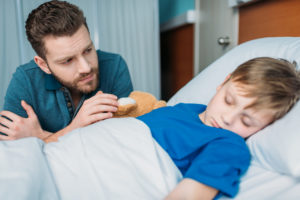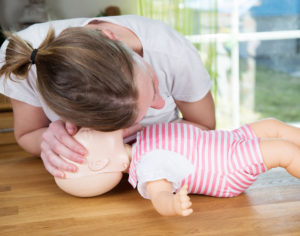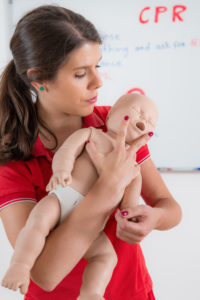Being a parent comes with an immense responsibility, including ensuring the safety and well-being of your children. One way to be prepared for emergencies is by getting trained in Basic Life Support (BLS). At United Medical Education, we provide free BLS training that can equip parents with vital life-saving skills. Let’s delve into why BLS training is essential for every parent.
Emergencies Can Happen Anywhere, Anytime
Emergencies are unpredictable, and when they involve your child, every second counts. Quick and effective response can be the difference between life and death.
-
Choking Incidents: Common with infants and young children who often put small objects in their mouth.
-
Drowning Accidents: A significant risk, especially in households with pools or during family outings to beaches or lakes.
-
Cardiac Arrests: While rare in children, they can still occur due to congenital heart conditions or severe injuries.
BLS training gives parents the knowledge and skills to respond effectively in these critical situations, potentially saving their child’s life.
Empowerment and Confidence
Proper education can provide parents with a sense of empowerment. Knowing you possess the skills to protect your child’s life is reassuring.
-
Knowledge is Power: BLS certification arms you with the knowledge to act quickly and efficiently in emergencies.
-
Boosts Confidence: Being BLS certified instills a confidence that can help keep you calm and focused during a crisis.
Reinforces Parent-Child Safety
The course doesn’t just benefit parents; it can also teach children about safety and the importance of life-saving techniques.
-
Role Modeling: Parents who are properly trained can model safety-conscious behavior to their children.
-
Awareness: Older children can learn about the principles of BLS, making them more safety-aware.
Dealing with Choking Incidents
Choking incidents are a common hazard among infants and young children. Children have a natural curiosity to explore the world around them, often by putting small objects in their mouths.
This curiosity can lead to accidental choking. Proper emergency education equips parents to recognize the signs of choking and teaches the appropriate responses such as back blows and chest thrusts. Having these skills means you can intervene immediately, before professional medical help arrives, significantly improving the outcome for your child.
Preventing Drowning Accidents
Drowning is a major risk for children, especially for those who live near bodies of water or in homes with swimming pools. Young children can silently slip into water and get into trouble very quickly.
Emergency education includes knowledge on how to respond to drowning incidents, including rescue breaths and chest compressions. Additionally, it emphasizes the importance of prevention measures, such as constant supervision around water, using safety gates for pool access, and even teaching your child to swim at an appropriate age.
Understanding Sudden Cardiac Arrests in Children
While sudden cardiac arrests are less common in children than adults, they can still occur and are often due to congenital heart conditions or severe injuries. In these instances, every second counts, and knowing how to administer pediatric BLS, including the use of Automated External Defibrillators (AEDs), can mean the difference between life and death.
Emergency education in life saving techniques ensures that as a parent, you are prepared to respond swiftly and appropriately to such emergencies.
Parental Safety Measures
Apart from knowing how to respond to emergencies, parents can take several proactive measures to keep their children safe. This includes baby-proofing the home to prevent access to small objects, securing furniture to prevent toppling, and storing medicines and cleaning products out of reach.
Teaching your child about safety rules and the dangers of certain activities can also help prevent accidents. In terms of water safety, never leave a child unattended near water, even for a moment, and consider enrolling them in swimming lessons as soon as it’s appropriate. Remember, safety measures are just as critical as knowing how to respond to emergencies.
United Medical Education: Your Partner in BLS Training
At United Medical Education, we’re committed to providing comprehensive and accessible BLS training. Here’s how you can begin your BLS training journey:
-
Free Student Account: Create a free student account on our website, giving you access to library of educational materials and practice exams.
-
Self-Paced Learning: Study at your own pace. Our courses allow you to balance training with your busy parenting schedule.
-
Certification: When ready, purchase access to the final exam. Upon passing, you’ll receive a provider card and certificate, validating your new education and skills.
Stories to Remember
My friend Pete is a nurse at a sports medicine clinic. His story is actually what inspired me to write this article. He recently told me about a parent who was also the coach of his daughter’s youth soccer team. One of the players started to choke on a hotdog she was eating after practice ended. The coach, having taken a BLS course, recognized the signs of distress immediately and started the Heimlich maneuver while an ambulance was called. The coach’s quick action likely saved that little girls life. These are important techniques to learn. When seconds count it’s always best to know exactly how to respond in such a situation.




